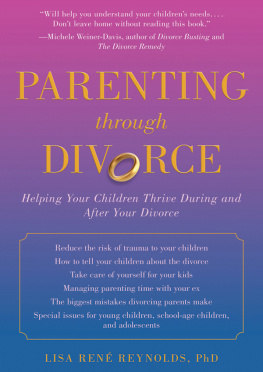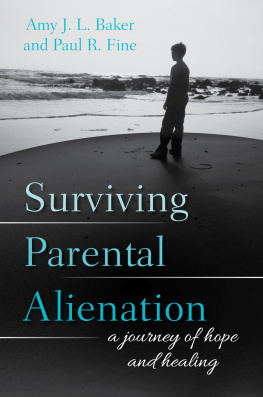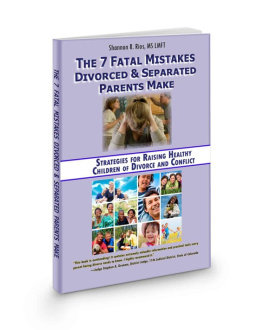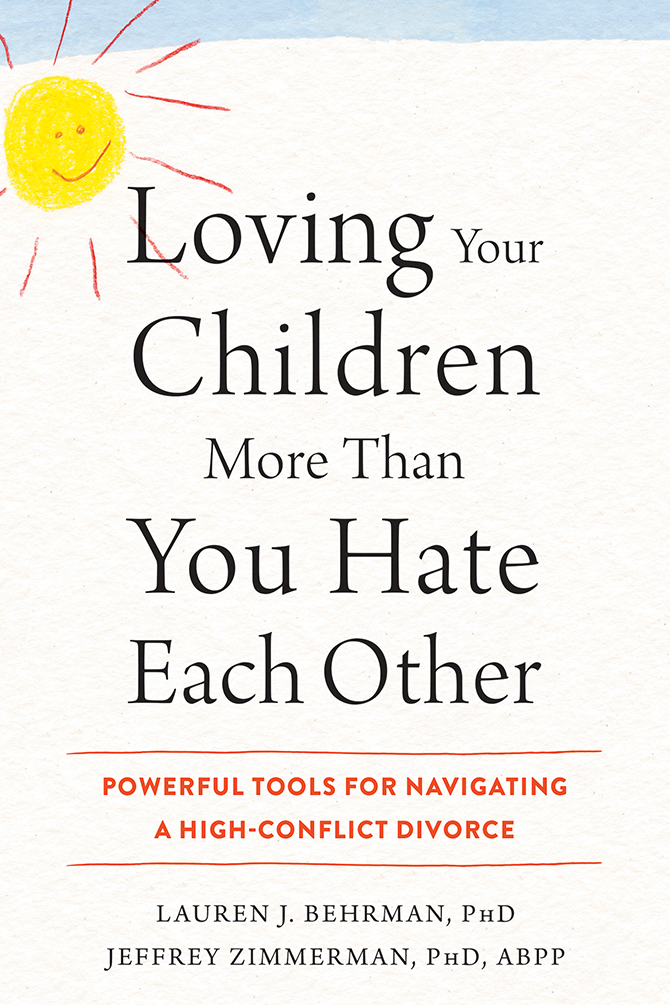I recommend this practical and insightful book to all parents who love their children and seek to preserve their well-being during and after divorce.
Hon. Sondra M. Miller , Retired Justice of the Appellate Division of the Supreme Court, Second Department
In this book, Lauren Behrman and Jeffrey Zimmerman have given divorcing parents a remarkable resource for radical acceptance of ones former spouse as he or she actually isthe starting point for putting aside attachment to who is right and who is wrong, and instead cultivating the conditions in oneself for doing the best possible job of minimizing conflict and maximizing good parenting. Behrman and Zimmerman translate wisdom from many traditionspsychotherapy, brain science, dialectical behavior therapy (DBT), mindful awareness, and much more into very practical tools and techniques for moving from victimhood toward competency and equanimity. While their book is addressed to parents in high-conflict divorces, the techniques they offer can make the challenges of raising kids in two households easier for every divorcing couple.
Pauline H. Tesler , longtime family law specialist, fellow of the select American Academy of Matrimonial Lawyers, and founding director of the Integrative Law Institute at Commonweal
Loving Your Children More Than You Hate Each Other is a valuable, interactive guide for co-parents caught in the struggles of a high-conflict divorce. Authors Behrman and Zimmerman cover a full range of emotional responses and behavior patterns that hinder co-parenting success. With compassion and wisdom, they offer strategies for detoxifying messages and generating positive alternatives that build bridges toward safety, respect, and cooperation that support everyone in the family.
Rosalind Sedacca , divorce and parenting coach; founder of the Child-Centered Divorce Network
Expertly weaving contributions from our understanding of the grief process, DBT, mindfulness, and their own extensive work with high-conflict co-parents, the authors provide professionals and parents a guide to healing and building respectful and functional co-parenting relationships, even when they would rather keep fighting. The beneficiaries of this well-organized, practical book are children and building a societal ethic of cooperative shared parenting.
Matthew Sullivan, PhD , founder of Overcoming Barriers, a nonprofit organization that provides training and programs for high-conflict shared custody; coauthor of Overcoming the Co-Parenting Trap
Loving Your Children More Than You Hate Each Other is an easy-to-read, practical guide for parents to reduce conflict and recover from divorce by focusing on the needs of their children. Parents will identify with the emotional challenges that are described and, through meaningful exercises, move into a new, more resilient and centered place. Behrman and Zimmerman walk parents through this recovery process, incorporating vignettes parents can identify with and ideas from brain science, mindfulness, and DBT to develop skills and techniques that reduce anger and build coping. This is a must-read for parents in conflict who want to move on, focus on raising healthy and well-adjusted children, and learn life skills that make them feel like heroes, rather than survivors or victims.
Robin M. Deutsch, PhD, ABPP , director of the Center of Excellence for Children, Families and the Law; professor in the clinical psychology doctoral program at William James College; and coauthor of 7 Things Your Teenager Wont Tell You
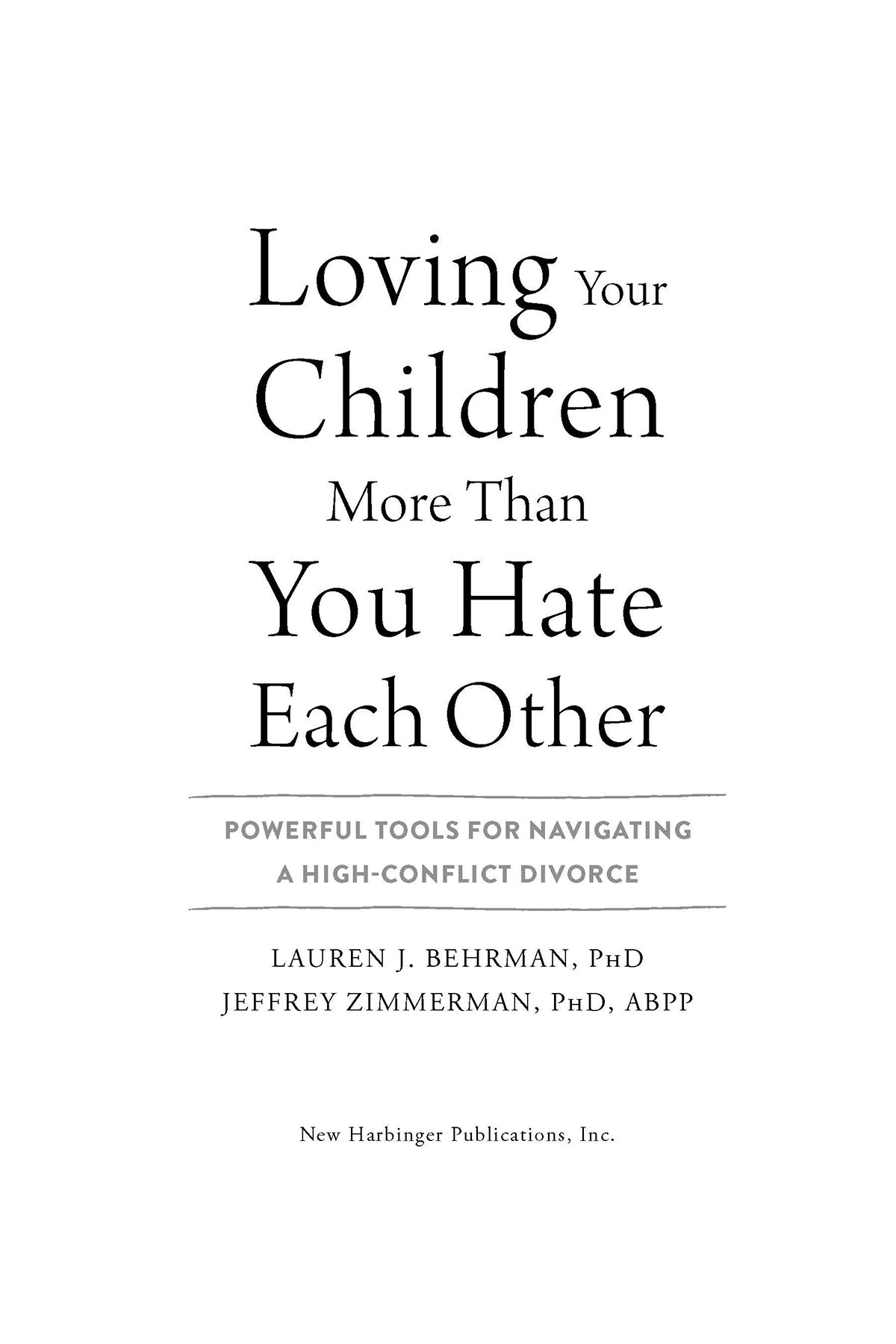
Publishers Note
This publication is designed to provide accurate and authoritative information in regard to the subject matter covered. It is sold with the understanding that the publisher is not engaged in rendering psychological, financial, legal, or other professional services. If expert assistance or counseling is needed, the services of a competent professional should be sought.
Distributed in Canada by Raincoast Books
Copyright 2018 by Lauren J. Behrman and Jeffrey Zimmerman
New Harbinger Publications, Inc.
5674 Shattuck Avenue
Oakland, CA 94609
www.newharbinger.com
Cover design by Amy Shoup
Acquired by Ryan Buresh
Edited by Rona Bernstein
All Rights Reserved
Library of Congress Cataloging-in-Publication Data on file
We dedicate this book to our children, Jonathan and Sarah, Ali and Rob, Micah, Liza, and Eli; our grandchildren, Abigail, Sophia, and Daniel; Phyllis Channin; and all our parents. You are our inspiration and we love you all dearly. We also dedicate this book to all children whose parents are caught in conflict. We hope to give your parents tools for allowing the light of their love for you to create a family at peace.
Contents
Introduction
M any parents go through a rocky period surrounding a divorce and find that within a few years after a judgment or settlement, they have settled into a new routine, they are focused on parenting their children together, and their emotions have quieted down. We are writing this book for those parents who find themselves caught in a perpetual battle with each other even after the dust of the divorce process has settled. These are the scores of parents we have seen in our offices over the past twenty-five years, often scarred and battle-weary. We are also writing for their children, who can be caught in family wars that continue for years beyond their parents divorce. What children need most is the protective cocoon of two adult parents (their primary caretakers) working together to guide them through the choppy waters of this challenging transition in the family. This book offers tools for healing and moving forward to help you manage your emotions and focus your attention on the well-being of your children. We provide a structure for you to hold onto when life feels chaotic and clarity feels hopeless, so that you can come through the storm of the divorce and its aftermath with the strength and vision needed to do the most important job of your liferaise your children with love in a family of peace.
The concepts in this book draw on many different approaches to helping people deal with stress, emotional trauma, conflict, loss, and depression. Some pertain to cognitive, interpersonal, and humanistic therapies, and some originated in non-Western psychotherapy traditions such as Buddhist teachings. Our intent is to give you a diversified set of tools to break the cycle of conflict between you and your former spouse (your co-parent) that plagues you and your children. The tools were developed based on a number of recent advances in our understanding of adult attachment, relationships, and conflict, as well as studies of the brain and nervous system. Some of the tools also come from different psychotherapeutic, skill-building, and psychoeducational approaches, including mindfulness and dialectical behavior therapy, or DBT (Linehan 1993), that help you change your emotional and behavioral responses by shifting the way you think about stress, emotional pain, and relationships.
The philosophy and theory that underlies DBT deserves special mention. This approach focuses on helping people who are in extreme emotional states and having difficulty regulating their thoughts and emotions (Linehan 1993) . DBT skills provide a structure and framework to help parents who are in chronic states of high conflict in their interactions with each other, creating an extreme state of distress that threatens their sense of emotional well-being and security. DBT is based on teaching basic psychosocial skills that, in combination, can give you fuller access to what Linehan terms your wise mind (Linehan 1993) and what we have called your centered self, which we will describe throughout this book.


